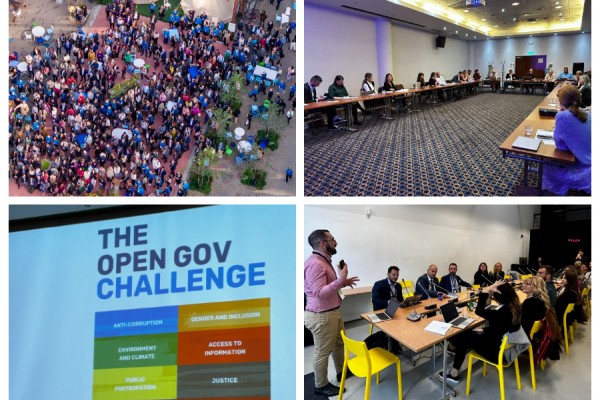
OGP Summit 2023: ReSPA’s Regional Dialogue as an Impetus to Overcoming Barriers in Building more Transparent and Open Western Balkans Societies
6-8 September 2023, Tallinn, Estonia
This year, for two days, Tallinn was the centre of the world when it came to the Open Government Partnership (OGP). Traditionally, ReSPA took an active role in the OGP Global Summit and organised an OGP Regional Dialogue on Open Data session and a one-day OGP Western Balkans Meeting, co-organised with the OGP Support Unit. Besides, ReSPA attended the panel organised by OGP regarding the possibilities of involving schools of government in programme activities of OGP globally.
On the 06th of September, ReSPA took part in the session organised by Joseph Foti, Chief Research Officer in Open Government Partnership, about the new OGP Strategy’s line of work related to collaboration with Schools of Government. This line of work will involve collaborating with schools of government, public policy, and politics (as well as other learning partners) to diffuse open government thinking, approaches, and skills across government and beyond. ReSPA was invited to participate as the European practice in building the knowledge of the civil servants in the Western Balkans on OGP through various capacity-building events. Olivera Damjanović, ReSPA Programme Manager, presented modalities and topics of work that ReSPA included in a range of capacity-building activities dedicated to OGP principles, policy areas and specific topics (Open data) which were implemented in cooperation with the OGP Support Unit. During the last six years, these activities included Western Balkans high officials, national Points of Contact and civil servants working on implementing specific OGP commitments and measures. After the presentations from Europe and Latin America (Alvaro Ramirez-Alujas, University of Chile), the discussion continued in smaller groups where practitioners, educators and project leaders from all regions discussed the different aspects of educational work so far as useful inputs for planning the activities within new OGP line of work for 2023 and 2024.
The OGP Western Balkans Regional Dialogue Session on Open data on 07th September dealt specifically with open data as a central topic of meeting OGP Point of Contact from ReSPA Members. Discussing the implementation of the OGP commitments and measures related to Open data from ReSPA Members OGP National Action Plans and embedding the results of such measures into the Open data system (good practice from Romania) were in the spotlight.
The findings of the OGP Independent Reporting Mechanism (OGP IRM) on the achievements and failures in the implementation of many measures on Open data in WB administrations, as well as the success factors that underpinned the successful cases or the lack of which caused the partial implementation was a useful indication on the external influences that need to be taken into account when formulating the measures. Andreas Pavlou from OGP IRM emphasised the need to appraise the possible results that implementing the measures related to Open data might produce when planning the Open data commitments. Larisa Barac, OGP PoC from Romania, presented the latest developments from Romania in boosting Open data publishing and how Romania is including the perceived use and re-use of Open data when bringing in new policy measures for Open data publishers. Both presentations were followed by questions posed to presenters and with lively discussions of the OGP Point of Contact from Albania, Bosnia and Herzegovina, Montenegro, North Macedonia and Serbia all pointing out the challenges but also the progress that is being made or is envisaged as the result of the current OGP measures related to Open data. The issues of low level of opening government data sets, inadequate formats, lack of employees and lack of knowledge on the institutional side and the side of the civil servants were among the most discussed topics by the OGP PoC from ReSPA Members.
On 08th September, the national Point of Contact, representatives from key CSOs and public officials dealing with OGP from the Western Balkans and Eastern Partnership jointly participated in the session dedicated to developing and enhancing the digitised communication channels between governments and citizens. Key requirements for creating digital means for public participation, indispensable human-centred design of such tools, need for an agile approach in incremental creation and combining digital tools with traditional ones so that no one is left behind were some of the main topics shared within an exciting panel by long-acting professionals Diana Dayer (Fundacion Corona, Colombia) and Ekaterina Petrikevich (Participation Factory, Czech Republic). Margus Gering from the Estonian Centre for International Development acquainted more than fifty attendees with examples of the digital platforms from Estonia and Ukraine, which, with various features, enable citizens to get efficient public services and communicate with public providers and governments on several issues of importance for the citizenry. The meeting continued with the session related to anticorruption measures stemming from OGP commitments and the tireless efforts that Transparency International and other CSOs in the Western Balkans invest in fighting corruption through activities focusing on enhancing transparency, public oversight and accountability. The last session at the meeting gave an intriguing insight into the link between corruption and government spending public funds on projects tackling climate change. It pointed out that the importance of accumulated knowledge within the civil sector needed to be put in use at the early stage of public spending for effectively overseeing the purposeful spending of the public sector for the actions related to climate, including green procurement.



